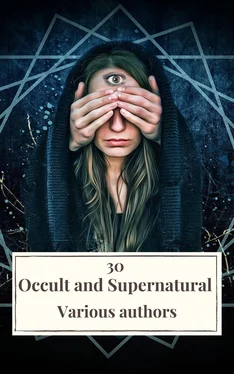'Lois,' he said, 'thou rememberest the words that I spoke while we yet mourned over my father. I think that I am called to marriage now, as the head of this household. And I have seen no maiden so pleasant in my sight as thou art, Lois!' He tried to take her hand. But she put it behind her with a childish shake of her head, and, half-crying, said:
'Please, Cousin Manasseh, do not say this to me. I dare say you ought to be married, being the head of the household now; but I don't want to be married. I would rather not.'
'That is well spoken,' replied he, frowning a little, nevertheless. 'I should not like to take to wife an over-forward maiden, ready to jump at wedlock. Besides, the congregation might talk, if we were to be married too soon after my father's death. We have, perchance, said enough, even now. But I wished thee to have thy mind set at ease as to thy future well-doing. Thou wilt have leisure to think of it, and to bring thy mind more fully round to it.' Again he held out his hand. This time she took hold of it with a free, frank gesture.
'I owe you somewhat for your kindness to me ever since I came, Cousin Manasseh; and I have no way of paying you but by telling you truly I can love you as a dear friend, if you will let me, but never as a wife.'
He flung her hand away, but did not take his eyes off her face, though his glance was lowering and gloomy. He muttered something which she did not quite hear, and so she went on bravely although she kept trembling a little, and had much ado to keep from crying.
'Please let me tell you all. There was a young man in Barford — nay, Manasseh, I cannot speak if you are so angry; it is hard work to tell you any how — he said that he wanted to marry me; but I was poor, and his father would have none of it, and I do not want to marry any one; but if I did, it would be — ' Her voice dropped, and her blushes told the rest. Manasseh stood looking at her with sullen, hollow eyes, that had a glittering touch of wilderness in them, and then he said:
'It is borne in upon me — verily I see it as in a vision — that thou must be my spouse, and no other man's. Thou canst not escape what is foredoomed. Months ago, when I set myself to read the old godly books in which my soul used to delight until thy coming, I saw no letters of printers' ink marked on the page, but I saw a gold and ruddy type of some unknown language, the meaning whereof was whispered into my soul; it was, "Marry Lois! marry Lois!" And when my father died, I knew it was the beginning of the end. It is the Lord's will, Lois, and thou canst not escape from it.' And again he would have taken her hand and drawn her towards him. But this time she eluded him with ready movement.
'I do not acknowledge it be the Lord's will, Manasseh,' said she. 'It is not "borne in upon me," as you Puritans call it, that I am to be your wife. I am none so set upon wedlock as to take you, even though there be no other chance for me. For I do not care for you as I ought to care for my husband. But I could have cared for you very much as a cousin — as a kind cousin.'
She stopped speaking; she could not choose the right words with which to speak to him of her gratitude and friendliness, which yet could never be any feeling nearer and dearer, no more than two parallel lines can ever meet.
But he was so convinced, by what he considered the spirit of prophecy, that Lois was to be his wife, that he felt rather more indignant at what he considered to be her resistance to the preordained decree, than really anxious as to the result. Again he tried to convince her that neither he nor she had any choice in the matter, by saying:
'The voice said unto me "Marry Lois," and I said, "I will, Lord."'
'But,' Lois replied, 'the voice, as you call it, has never spoken such a word to me.'
'Lois,' he answered, solemnly, 'it will speak. And then wilt thou obey, even as Samuel did?'
'No, indeed I cannot!' she answered, briskly. 'I may take a dream to be truth, and hear my own fancies, if I think about them too long. But I cannot marry any one from obedience.'
'Lois, Lois, thou art as yet unregenerate; but I have seen thee in a vision as one of the elect, robed in white. As yet thy faith is too weak for thee to obey meekly, but it shall not always be so. I will pray that thou mayest see thy preordained course. Meanwhile, I will smooth away all worldly obstacles.'
'Cousin Manasseh! Cousin Manasseh!' cried Lois after him, as he was leaving the room, 'come back. I cannot put it in strong enough words. Manasseh, there is no power in heaven or earth that can make me love thee enough to marry thee, or to wed thee without such love. And this I say solemnly, because it is better that this should end at once.'
For a moment he was staggered; then he lifted up his hands, and said,
'God forgive thee thy blasphemy! Remember Hazael, who said, "Is thy servant a dog, that he should do this great thing?" and went straight and did it, because his evil courses were fixed and appointed for him from before the foundation of the world. And shall not thy paths be laid out among the godly as it hath been foretold to me?'
He went away; and for a minute or two Lois felt as if his words must come true, and that, struggle as she would, hate her doom as she would, she must become his wife; and, under the circumstances, many a girl would have succumbed to her apparent fate. Isolated from all previous connections, hearing no word from England, living in the heavy, monotonous routine of a family with one man for head, and this man esteemed a hero by most of those around him, simply because he was the only man in the family, — these facts alone would have formed strong presumptions that most girls would have yielded to the offers of such a one. But, besides this, there was much to tell upon the imagination in those days, in that place, and time. It was prevalently believed that there were manifestations of spiritual influence — of the direct influence both of good and bad spirits — constantly to be perceived in the course of men's lives. Lots were drawn, as guidance from the Lord; the Bible was opened, and the leaves allowed to fall apart, and the first text the eye fell upon was supposed to be appointed from above a direction. Sounds were heard that could not be accounted for; they were made by the evil spirits not yet banished from the desert places of which they had so long held possession. Sights, inexplicable and mysterious, were dimly seen — Satan, in some shape, seeking whom he might devour. And at the beginning of the long winter season, such whispered tales, such old temptations and hauntings, and devilish terrors, were supposed to be peculiarly rife. Salem was, as it were, snowed up, and left to prey upon itself. The long, dark evenings, the dimly-lighted rooms, the creaking passages, where heterogeneous articles were piled away out of reach of the keen-piercing frost, and where occasionally, in the dead of night, a sound was heard, as of some heavy falling body, when, next morning, everything appeared to be in its right place — so accustomed are we to measure noises by comparison with themselves, and not with the absolute stillness of the night-season — the white mist, coming nearer and nearer to the windows every evening in strange shapes, like phantoms, — all these, and many other circumstances, such as the distant fall of mighty trees in the mysterious forests girdling them round, the faint whoop and cry of some Indian seeking his camp, and unwittingly nearer to the white men's settlement than either he or they would have liked could they have chosen, the hungry yells of the wild beasts approaching the cattle-pens, — these were the things which made that winter life in Salem, in the memorable time of 1691-2, seem strange, and haunted, and terrific to many: peculiarly weird and awful to the English girl in her first year's sojourn in America.
Читать дальше












